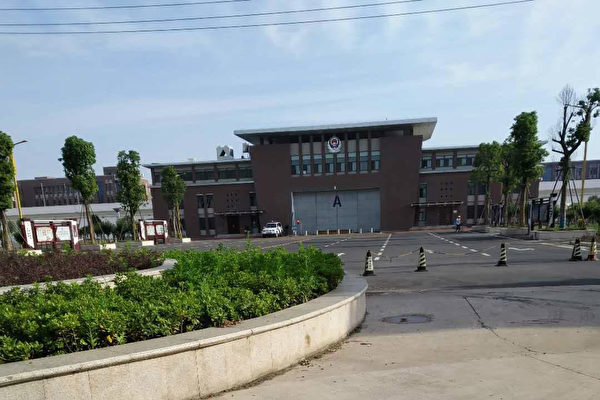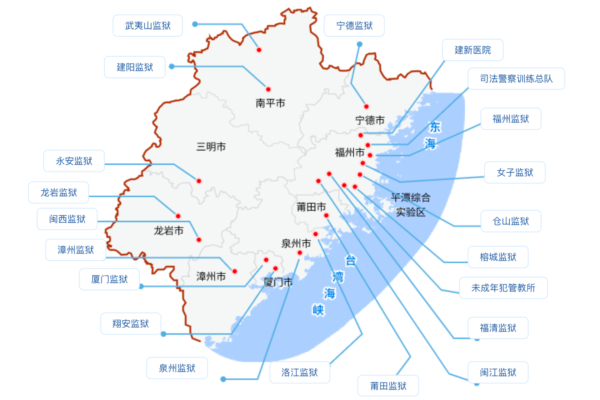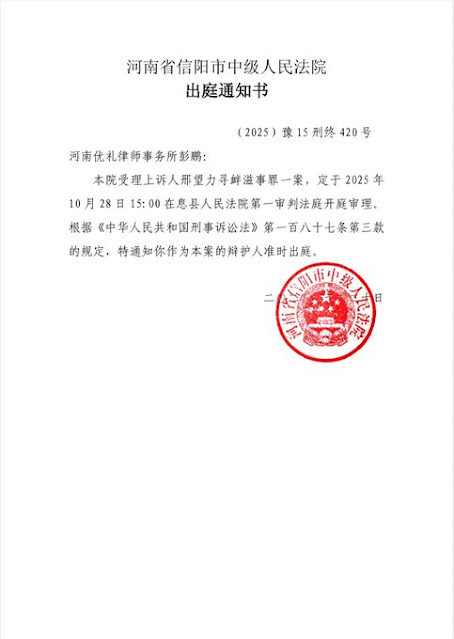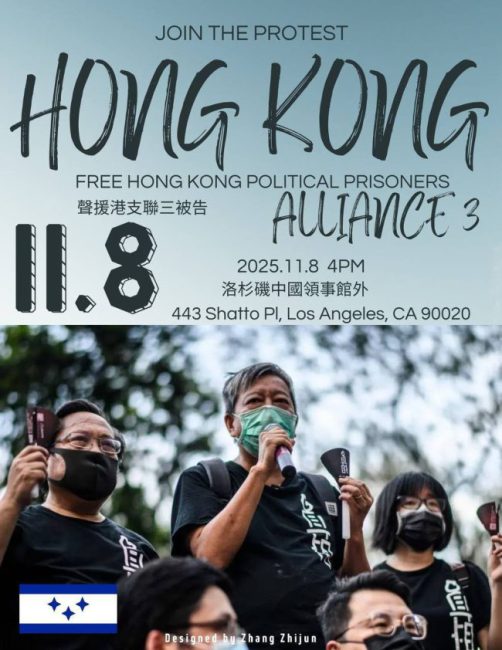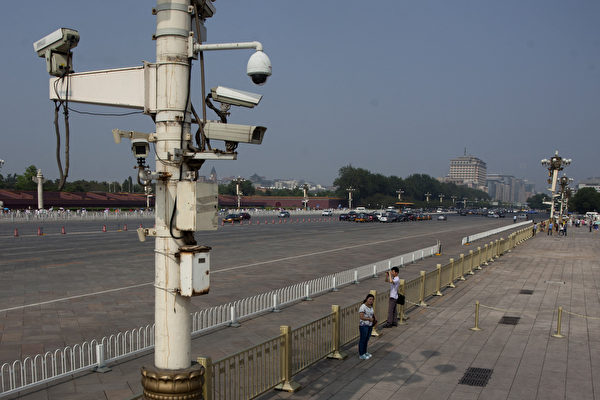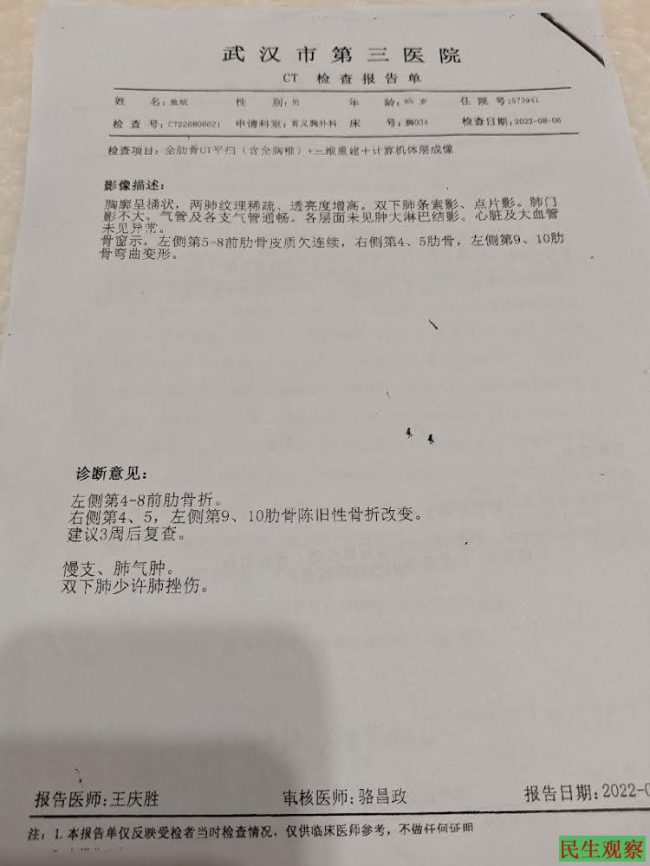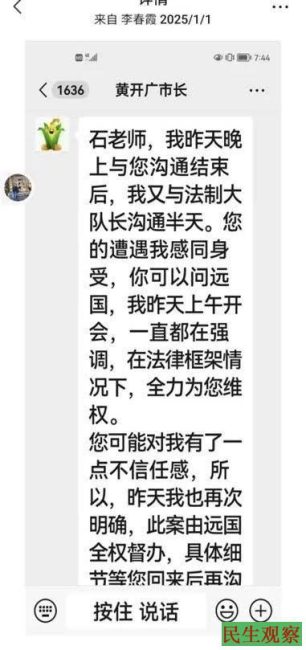Inside China’s Xinyang Prison: Abuse and Forced Labor
Xinyang Prison is described as the “worst” prison in China’s Henan Province. A human rights activist shared his father’s story with The Epoch Times, a former inmate who experienced and witnessed various abuses in the prison.
Xing Jian is a human rights activist from Henan and currently lives in New Zealand. His father, Xing Wangli, told him that abuse is rampant in Xinyang Prison.
“My father looked like an old man when he got out of prison. It was hell,” Xing Jian said.

After Xing Wangli was released from Xinyang Prison, he told his son, Xing Jian, about the abuses he experienced and witnessed in prison. The picture shows Xing Wangli, with Xing Jian on the upper right corner of the phone screen. (Courtesy of Xing Jian)
Xing Wangli is a petitioner and a native of Henan. In February 2018, he was sentenced to two years and three months for “picking quarrels and provoking trouble,” a vague charge often used to detain dissidents in China, after he went to a hospital in Beijing for treatment. Petitioners who go to Beijing (for various reasons) are usually arrested and detained by authorities. He spent more than a year in Xinyang Prison. He was released on May 26 this year.

Xing Jian said the inmates in Xinyang Prison are treated like slaves and are forced to work more than ten hours a day. The prison guards often beat them up, causing severe injuries. Petitioners get tortured and are banned from communicating with families and the outside world; while corrupt local Chinese Communist Party (CCP) officials who serve time in the same prison get special treatment and enjoy privileges because of their wealth and connections.
Former CCP Officials Get Special Treatment in Jail
Xing Jian said that Xinyang Prison is the worst prison in Henan Province. Inmates are forced to work thirteen hours a day, seven days a week, and without taking a day off.
Xinyang Prison is also known as “May 1 Farm” (May 1 is Labor Day or May Day celebrated in socialist/communist countries, including China). There is a saying in China’s prison system: “I would rather have a lifelong sentence than spend a day in May 1 [Farm].” Xing revealed that the prisoners there have heavy labor tasks. Those who fail to meet their quota are beaten with a leather stick by the prison guards, while being pinned down by other inmates. When the local procuratorate does an inspection, the prison puts on a show, lying to the inspectors that the prisoners only work for eight hours. The inmates are pressured to keep silent about the abuses, otherwise they would be punished.
China’s prison economy has been providing big business for the Chinese regime for decades, supported by free and/or very cheap labor. According to the data provided by the Ministry of Justice, “compared with 1984, in 2001 the total output value of prison enterprises nationwide increased from 2.77 billion yuan (1984) to 11.72 billion yuan, an increase of more than four times; fixed assets increased from 3.4 billion yuan to 11.6 billion yuan.”
According to a 2019 report by the World Organization to Investigate the Persecution of Falun Gong (WOIPFG), there are at least 681 state-owned prison slave labor enterprises in 30 provinces, cities, and regions in China.
The CCP took advantage of the pandemic to exert its influence and make huge profits through Chinese companies that use prison slave labor to produce masks and export them to the rest of the world.
China’s prison system has long been criticized by the international community. U.S. lawmakers have called for a boycott of China’s prison slave labor products and have proposed bans on companies that use forced labor in Chinese prisons and concentration camps. Since 2019, the Trump administration has imposed restrictions on such products and companies.
The average prisoners are forced into slave labor in Xinyang Prison and are often starved—they don’t get proper nutrition, such as meat. In contrast, the prisoners who have connections, such as former local officials who were jailed for corruption, are well-fed and enjoy other privileges. They can avoid doing any work by bribing the prison guards. In some cases, they pay the prison 12,000 yuan ($1,762) per year for a “job title” that doesn’t require them to do any work. For example, prisoners in the education zone do nothing but use the on-duty monitoring computer to play games.
Xing Jian gave two examples of former officials from Henan who received special treatment in prison—Li Xinzhong, former head of Zhengyang county in Zhumadian city; and Lian Ziheng, secretary of the Sanmenxia Municipal CCP Committee.
According to mainland Chinese media reports, Li Zhongxin was Henan’s former deputy bureau director. In February 2016, he served as secretary of the Party Working Committee of Zhumadian Urban-rural Integration Demonstration Zone, ranking at the deputy bureau director level. Li was dismissed in 2018 and on Oct. 22 that same year, he was sentenced to 10 years in prison for accepting bribes.
According to Xing Jian and his father, these sacked officials don’t do any work in prison, and their sentences are reduced quickly. The prison guards treat them well, and their family members can send them food, as well as cigarettes and alcohol. They can use prison guards’ phones to make calls; while the other inmates are denied the right to make any phone calls.
Petitioners Suffer Abuse in Prison
Xing Jian learned that while Xing Wangli was serving his sentence in Xinyang Prison, he witnessed that many prisoners were beaten and severely injured. One inmate was beaten until he lost his eyesight, and another suffered a broken arm.
One inmate named Sun Yiliang, a petitioner who was serving a long sentence, often got beat up in prison. He told Xing Wangli that he wanted to die because of the abuse. Xing Wangli wrote to the warden on Sun’s behalf, pleading for help. The prison responded by threatening Sun. Xing Jian said that his father also asked him to let the outside world know about Sun’s situation.
Another petitioner, named Ding Jun, was also beaten and tortured frequently in the prison.
A veteran of China’s People’s Liberation Army (PLA), Chen Youhong, also suffered abuse. According to a “situation report” that circulated on Chinese social media, Chen was framed and sentenced to 12 years in prison for robbery. On Aug. 13, 2016, while serving his sentence in Xinyang Prison, he was beaten up by a guard, named Run Haihong, and became disabled. During a visit, Chen’s family members noticed that he could not raise his arm. The family petitioned multiple times for Chen to get medical treatment, but their requests have been ignored by the prison.
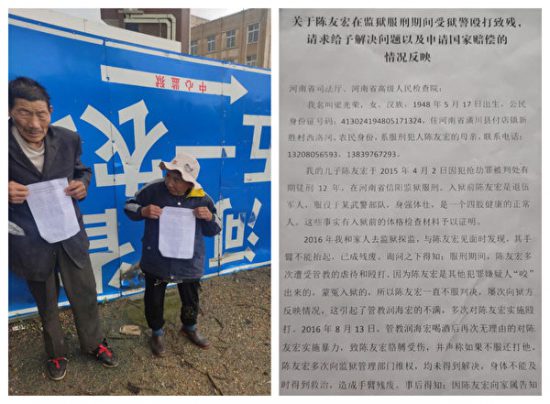
Xing Wangli suffered serious injury after being beaten by police. In 2016, while serving time at the Xixian Detention Center in Xi county, Henan Province, he was beaten with a blunt instrument which fractured his skull—he was in a coma for more than 20 days. Xing was forced to do labor despite his injury.
While Xing Wangli was in Xinyang Prison, he was cut off from his family and the outside world. On one occasion, he was allowed to send a message to his family via a fellow inmate, who was about to be released from prison and was from Xing’s hometown. Before Xing was released from prison in May 2019, a guard, surnamed Wu, slapped him, then told him to stand in the lobby for a long time, and fed him only one steamed bun for the whole day.
The Henan police also broke into Xing Wangli’s home and took more than 30,000 yuan ($4,400) in cash, a desktop computer, a laptop, and two digital cameras. However, the items were not returned after Xing was released from prison.
Xing Jian believes that his father is not guilty of any crimes even though he was sentenced three times. They have filed complaints to fight the charges but have not received a response from the authorities.
Xing Jian stated that officials in Henan are corrupt and they protect each other. They use mobs to suppress petitioners and dissidents, and collude with criminals for financial gain.
The official slogans “fighting criminals and eliminating evil” are all fake, Xing Jian said. The real criminals are at large—the CCP authorities, the prosecutorate, and law enforcement are the biggest criminal gang.

